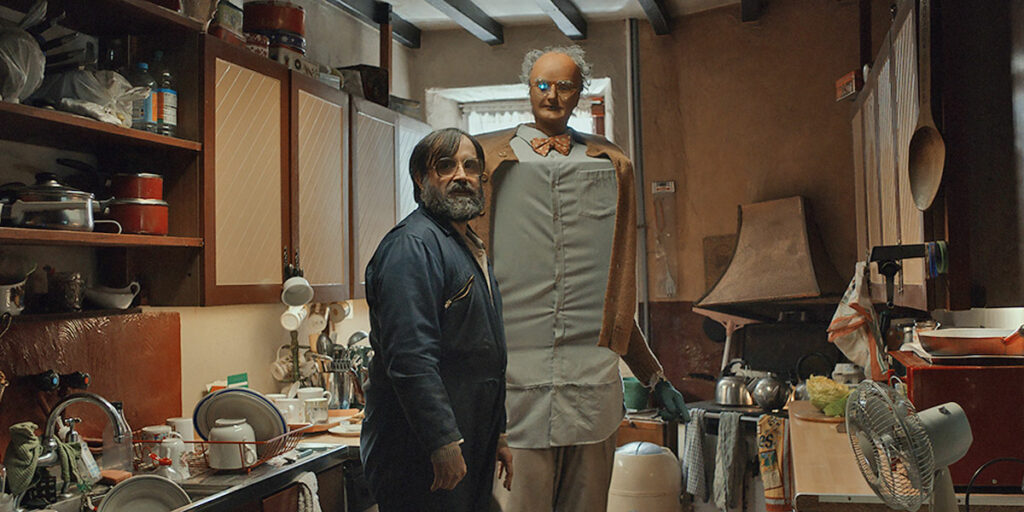With a look and feel inspired by Taika Waititi, Brian and Charles is a charming film about a man and the robot he builds in his rural Welsh cottage.
In a remote village in rural Wales, Brian (David Earl) lives alone in a cottage. He spends his days making inventions that are, for the most part, unsuccessful and useless (unless you want a pinecone bag or an egg belt). Although he is perfectly well on his own, it seems that Brian wants a friend – someone who can provide an extra pair of hands and then play darts with him. Then one day, while trawling through some rubbish, he finds a mannequin head. This gives him a brilliant idea. Soon, he’s building a lo-fi robot in his shed, using a washing machine and other odd parts. And amazingly, it works. The robot (Chris Hayward) comes to life and asks Brian to give it the name of Charles Petrescu. So begins a strange but touching friendship between the two.
Actually, the relationship that is key to Brian and Charles is less a friendship and more a surrogate father-son pair. Brian quickly takes to calling Charles ‘boy’ and holds his hand like a child. That is seen in a montage full of pillow fighting and Charles riding a bike for the first time, all set to The Turtles’ ‘Happy Together.’ During the film, though, Charles begins to want more and more independence – whether it is going into the village or to Honolulu. But Brian dismisses it, trying instead to hide his robot’s existence from the world and fearsome local bully (and thief) Eddie (Jamie Michie). So Charles turns into a stroppy teenager, blaring loud music from his room. And the question of whether Brian is protecting Charles or being overprotective becomes an important theme.
Brian and Charles is the first feature from Jim Archer, who is adapting his 2017 short of the same name. It also marks the creative debuts of Earl and Hayward, who are co-writers on the film with characters adapted from their live comedy sets. Here, Archer and co have retained the mockumentary style of the short, complete with handheld camerawork and natural silences. We even get pauses through shots of windswept, deserted fields that give the film a sense of place and isolation. But the style does jar at times. There are scenes where this mockumentary is more dramatic and conventionally filmed than it perhaps should be, especially when we shift to a darker tone for the final third.
On the other hand, those final scenes work thanks to David Earl’s terrific performance. As an actor, Earl is best known for working alongside Ricky Gervais in Derek and After Life. Here, he apes the awkward charm of Gervais’ most famous characters to create an outsider who it is easy to root for. When Brian is inventing, he is a perseverant man, even if what he makes is misguided and bizarre. However, outside his house, he is a shy and meek individual who must find his voice against Eddie. Earl also has endearing chemistry with Louise Brealey, who plays his just-as-awkward love interest, Hazel.
Overall, Brian and Charles is a charming comedy-drama about a man, the robot he builds and the bond that forms between them. The mockumentary style may be a little inconsistent, and the film itself may be very quirky – full of cabbages, retro houses and jumbled contraptions. But it is never annoyingly whimsical, thanks in part to the sincerity and innocence of its characters. Furthermore, its look and feel seem to be inspired by the work of Taika Waititi. It’s not just the rural setting and the mockumentary style (a la What We Do in the Shadows) but also the way Jim Archer balances comedy and drama like Waititi. The way the quirks are balanced with a heap of emotion and pathos. Like the inventions of its main character, Brian and Charles is not world-changing. However, it is a short and delightful film with a satisfying payoff.
Brian and Charles is now available to watch on digital and on demand.

